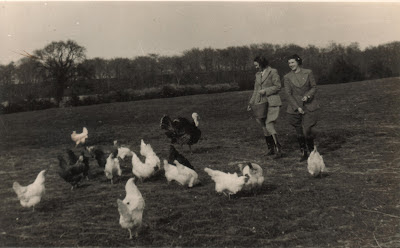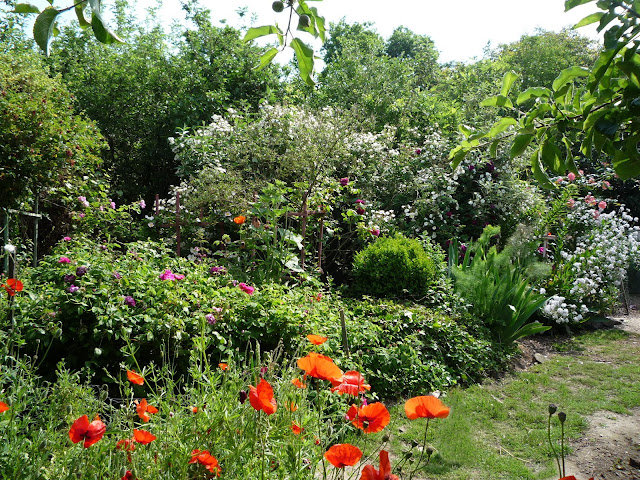
We Are What Our Hens Eat
In a flower and food forest garden with three hen houses, a mix of hens, cockerels and fantails he and his peers have created a complex hierarchy and designated territorial boundaries based on distinct garden features and specific plantings. The only time when anything has gone really wrong with this balance is when we have inadvertently tipped the scales. Everything I have learned over the past ten years of living with our flock has been achieved by mutual respect, trust and observation. In fact, I often think they now know more about us than we will ever manage to learn about them.
 Approaching the frontier. This set of recycled oak gates, which we set up as a feature at the end of a pergola and which mark the entrance to the orchard, have been designated a border by the hens. There are always a few skirmishes which take place from time to time but no actual contact fighting. I am not sure if it is because the land rises here, the physical, although easily negotiated obstacle or the continuation of a large flower border.
Approaching the frontier. This set of recycled oak gates, which we set up as a feature at the end of a pergola and which mark the entrance to the orchard, have been designated a border by the hens. There are always a few skirmishes which take place from time to time but no actual contact fighting. I am not sure if it is because the land rises here, the physical, although easily negotiated obstacle or the continuation of a large flower border.
Whatever the reason, it is their choice and moreover it works. There is another interesting mores I have also observed. Mother hens with chicks have rights of passage through all areas. All three flocks recognise this and abide by it. Its intent may be to allow the Mother hen a wider area in which to forage for her chicks. In this way, I have concluded that the flock has an understanding of and places a high value on continuance.
I was born in England on a small mixed arable and poultry farm at a time when the Agro Chemical Industry was beginning to dominate the scene and family farms like ours, which were run much in the same way as my great-grandfather had farmed, were beginning to disappear. The Organic Movement, which had started in the 1920s in the UK and was often referred to by the epithet 'Muck and Mystery' was still something ironically, too outré to be considered as a way to farm. After an unhappy decade or so with the modern methods of 'deep litter' production, my father gave up farming altogether and went on to pastures new. I always remember the reason he gave me as a child for removing us from what I know we both thought of as an idyllic place to live: "Farming is totally unnatural".
My intended aim whether in smallholding or gardening is to find a model of doing both in the nearest possible way to that in which birds and plants would thrive and survive in Nature. Just as 'weeds' can provide beauty, food and aid pest control in a garden, so poultry can, if only you work with and not against them. You can best do this by allowing them to choose and forage for their diet whilst living in self-governing flocks as they would in the wild. Of course harmony in a garden is different to the Wild, for example the very nature of a limited and enclosed habitat, such as a garden or woodland, is finite and is therefore controlled. However, as long as there is enough space per bird, dedicated areas for vegetable production and a large enough supply of vegetation the system can work. In a food forest garden poultry work to keep down pests, work compost into the soil and generally improve its fertility.

Wild poppies, the most beautiful addition to any garden and with a delicate fragile grace rarely seen in their cultivated cousins. Vegetables in Elizabethan England were the weeds of
today, chickweed, nettles, navelwort and Good King Henry. Recently however, these are returning to favour and with them an understanding of how wasteful we have been with our limited knowledge of the edible parts of the cultivated ones.
Going Backwards to Go Forward.
 These are the Landgirls, who helped on the farm whilst my Grandmother was farming. A change of clothing (they are much more chic than us) and this could be my sister and I on our respective smallholdings. It seems passing strange, or maybe not, that after thousands of years of organic farming someone decided we were doing it all wrong and everything had to be changed. Now thankfully, more people are becoming cognisant that food production is one of the most important activities in life. We can live without just about everything, even shelter but we certainly can not survive without good food and clean water. As people begin to re-evaluate food many of us are also doing the same with our lives and returning to the land and becoming self-sufficient. Working and living on the land is perhaps synonymous with doing the same on the sea and it's in the blood, whatever, I certainly never tire of it. It also makes me happy to know that we are giving our animals a good life and they, for their part, are paying us back ten fold with companionship, eggs, food for philosophical musings and hours of entertainment!
These are the Landgirls, who helped on the farm whilst my Grandmother was farming. A change of clothing (they are much more chic than us) and this could be my sister and I on our respective smallholdings. It seems passing strange, or maybe not, that after thousands of years of organic farming someone decided we were doing it all wrong and everything had to be changed. Now thankfully, more people are becoming cognisant that food production is one of the most important activities in life. We can live without just about everything, even shelter but we certainly can not survive without good food and clean water. As people begin to re-evaluate food many of us are also doing the same with our lives and returning to the land and becoming self-sufficient. Working and living on the land is perhaps synonymous with doing the same on the sea and it's in the blood, whatever, I certainly never tire of it. It also makes me happy to know that we are giving our animals a good life and they, for their part, are paying us back ten fold with companionship, eggs, food for philosophical musings and hours of entertainment!Thanks for dropping by and do feel free to share experiences or ask for further information in the comment section. If you have enjoyed this piece and found it useful think about sharing it with your family and friends, on social media and also maybe about joining this blog and/or subscribing to my Youtube, Odysee or BitChute Channel or even supporting us on Patreon or
It all helps to keep me going!
Until next time, all the very best from sunny Normandie!



